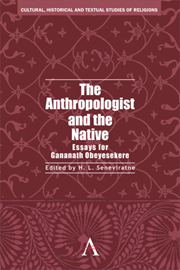Book contents
- Frontmatter
- Contents
- Editor's Note
- The Anthropologist and the Native: Essays for Gananath Obeyesekere
- SECTION I THE INDIAN TRADITION AND ITS REPRESENTATION
- SECTION II CASTE, KINSHIP, LAND AND COMMUNITY
- SECTION III RENUNCIATION AND POWER
- SECTION IV BUDDHISM TRANSFORMED
- ‘Buddhist Revival’ and the ‘Work of Culture’ in Sri Lanka, Past and Present
- Dharmapala's Buddhisms
- Religion and Globalization from the Historical Pespective of Thai Buddhism
- SECTION V THE ENIGMA OF THE TEXT
- SECTION VI THE ANTHROPOLOGIST AND THE NATIVE
- List of Contributors
Religion and Globalization from the Historical Pespective of Thai Buddhism
from SECTION IV - BUDDHISM TRANSFORMED
Published online by Cambridge University Press: 05 May 2012
- Frontmatter
- Contents
- Editor's Note
- The Anthropologist and the Native: Essays for Gananath Obeyesekere
- SECTION I THE INDIAN TRADITION AND ITS REPRESENTATION
- SECTION II CASTE, KINSHIP, LAND AND COMMUNITY
- SECTION III RENUNCIATION AND POWER
- SECTION IV BUDDHISM TRANSFORMED
- ‘Buddhist Revival’ and the ‘Work of Culture’ in Sri Lanka, Past and Present
- Dharmapala's Buddhisms
- Religion and Globalization from the Historical Pespective of Thai Buddhism
- SECTION V THE ENIGMA OF THE TEXT
- SECTION VI THE ANTHROPOLOGIST AND THE NATIVE
- List of Contributors
Summary
Globalization and Its Discontents
The term, ‘globalization,’ has been located primarily in the discourse of economics and politics. In the arena of the global economy the word evokes the activities of the International Monetary Fund, the World Bank, the World Trade Organization, the global dominance of multinational corporations, and popular brand names the likes of Nike, Gucci, Chanel, Coca-Cola, and McDonald's. In the sphere of politics Jan Scholte's felicitous term, ‘super territoriality’ (Scholte 2000) calls to mind international and regional organizations and alliance such as the United Nations, the European Union, NATO or ASEAN, and the historical forces of colonial imperialism or post-cold war American hegemonic power. However, globalization should not be seen solely in economic and political terms. Its impact on culture, religion, personal and community identity has been profound. One has only to stroll through the mega-shopping centers in Bangkok or Chiang Mai to observe the pervasive influence of Western styles, tastes, and mores in that country —an example that can be multiplied many times over in locales around the globe. A recent study of young Thai nouveau riche finds that owning popular brands is not a simple display of materialism but represents a search for personal identity and a way of negotiating relationships (Sukrung 2003). Possessing luxury brands has become a modern talisman, replacing traditional amulets and tattoos as a way of warding off evil, protecting the owner from uncertainty, providing peace of mind, and engendering confidence before one's peers.
- Type
- Chapter
- Information
- The Anthropologist and the NativeEssays for Gananath Obeyesekere, pp. 273 - 290Publisher: Anthem PressPrint publication year: 2011



